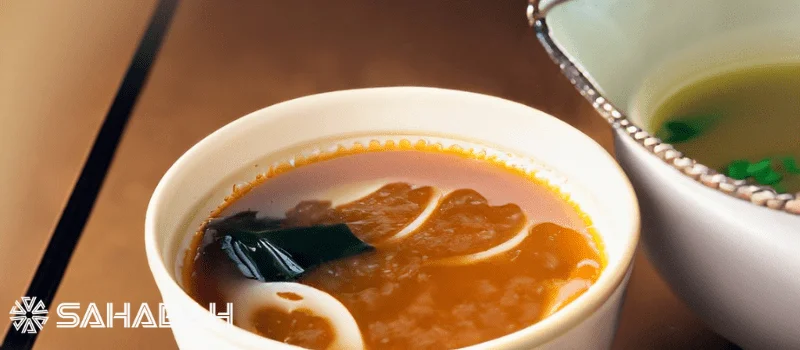Miso is a ubiquitous ingredient in Japanese cuisine. The salty, savory paste made from fermented soybeans adds rich depth of flavor to soups, sauces, dressings, marinades, and more. However, with miso’s starch and small amounts of alcohol content created during fermentation, some Muslims understandably ask: is miso halal?
In this comprehensive guide, we’ll answer questions around miso and halal status, including:
- What is miso, exactly, and how is it made?
- An overview of Islamic halal food requirements
- Evaluating miso’s ingredients and production methods for halal criteria
- How to identify and cook with halal certified miso products
- Finding halal miso and Muslim-friendly dining options while traveling in Japan
Let’s explore what makes miso halal or haram, Japan’s halal options, cooking with halal miso, and more to help you make an informed decision.
A Brief History of Miso
To start, what exactly is miso, and how did it become such an iconic Japanese flavoring?
Miso originated in China around 500 CE as hishio—a paste made by fermenting soybeans, cereal grains, and salt. This nutritious, protein-rich condiment likely traveled to Japan through Korean and Chinese Buddhist monks in the 7th century.
Over Japan’s Heian period (794-1185 CE), hishio evolved into miso—incorporating new ingredients and local production techniques. Miso became a staple seasoning for Japan’s peasant class by providing valuable protein and nutrients while also lending flavor to humble staples like rice, vegetables, and broths.
Today, thousands of mostly small, family-owned companies throughout Japan’s countryside still produce miso in traditional ways: mixing and fermenting soybean, cereal grain, salt, and koji mold ingredients in cedar vats for months or years. Over one million tons are made annually.
From its ancient roots to modern day, miso remains an emblem of Japanese food and culture. But is this iconic seasoning halal? Let’s break it down.
What is Miso Made Of? Overview of Ingredients & Nutrition
At its core, miso is made by fermenting soybeans and cereal grains with salt and koji rice mold (Aspergillus oryzae). This gives miso its characteristic rich, salty, savory flavor.
Typical core miso ingredients include:
- Soybeans – The main protein and nutrient source
- Grains (rice, barley, or rye) – Provides carbs and influences flavor
- Salt – Halal salt flavors and preserves the paste
- Koji rice – Introduces mold spores to break down starches and proteins
In addition to these main ingredients, some miso pastes may contain other elements like an alcohol preservative or dashi stock. We’ll evaluate these additions for halal compliance shortly.
In terms of nutrition, miso packs a hefty dose in a small serving:
- Rich in protein, vitamins, minerals, and probiotics
- Contains all essential amino acids
- Isoflavones with antioxidant properties
- Energy- and nutrient-dense condiment
Now that we understand miso’s core composition, let’s overview what Islamic dietary laws dictate to evaluate if miso meets halal standards.
Understanding Halal Food Standards in Islam
The Arabic word “halal” translates to “permissible” or “lawful” within Islamic law. For a food to be certified halal, it must meet certain guidelines around both its ingredients and preparation according to Quranic verses and hadiths.
Here is a quick summary of key halal diet requirements:
- No pork or pork byproducts
- No alcohol or other intoxicants
- No meat or meat derivatives from forbidden animals (dogs, monkeys, reptiles, beasts of prey, etc.)
- Animal meat and byproducts (milk, eggs, gelatin, etc.) must come from animals slaughtered per zabiha protocol
- No blood or blood byproducts
- Food contact surfaces must be clean
Sounds simple enough for miso so far. But multiple oversight steps are involved and specifics can vary between halal certifying organizations. Let’s break down miso’s composition and preparation method against common halal standards.
Evaluating Miso Ingredients & Production for Halal Criteria
At a high level view, vegetable and plant-based foods avoid some inherent concerns around haram meat products and animal slaughter methods. But we still need to dive deeper into miso’s specific elements.
Permissible Miso Ingredients
Miso’s main components bypass major areas of halal concern:
- Soybeans: Common permissible protein source
- Rice, barley, or rye: Halal cereal grains
- Salt: Typically halal sea salt or rock salt without additives
- Koji rice: Grown on a halal medium then dried into spores
As long as no questionable ingredients are added, miso’s core composition fits Islamic guidelines. Some misos add extras like alcohol or dashi stock which require scrutiny (more below).
Overview of Traditional Miso Fermentation Process
In addition to its ingredients, we must evaluate if miso’s standard production method has any areas of halal concern. Here is a quick overview:
1. Wash & Soak – The soybeans and grains are washed, soaked, and steamed.
2. Mix Koji – Koji rice introduces Aspergillus oryzae mold spores which produce enzymes for fermentation.
3. Mash Mixture – The main ingredients are mashed into a smooth paste.
4. Ferment – The mash is placed into cedar vats, mixed salt, weighted down, and left to slowly ferment for months up to 3 years depending on variety.
5. Pasteurize & Store – Finally, the miso paste is pasteurized to halt fermentation, then packaged for distribution and sale.
Since no animal products, questionable enzymes, or haram additives are traditionally used, miso’s ancient vegetable fermentation process avoids halal issues.
But two concerns sometimes come up: alcohol content from fermentation and any non-halal mixing ingredients.
Alcohol Content Questions
Like other fermented foods from pickles to vinegar, halal miso contains trace amounts of ethanol alcohol produced naturally through the fermentation process.
As starches break down over months-long fermentation, some alcohol is created through enzyme activity. However, multiple halal food agencies confirm miso contains no more than 1% alcohol by volume. This falls under the generally accepted threshold for halal foods.
Some miso makers add a very small amount (1-2%) of alcohol preservative at the end which helps stabilize the paste. But even at this level combined with fermentation alcohol, the trace alcohol content is considered permissible by Islamic authorities.
Of course, those avoiding alcohol altogether can verify if their particular miso states “no alcohol added” on certified halal miso labels.
Additional Ingredients Questions
Some mass-market miso producers add extras like dashi stock, chemical preservatives, or other enhancers which may or may not be halal compliant. Thus it’s essential to check the ingredients listing for halal miso verification.
Ideally, look for miso containing just the core components like organic soybeans, rice or barley, water, salt, and koji. These keep closest to miso’s traditional vegetable-based process.
How to Identify & Cook with Halal Certified Miso
Once you understand miso’s composition and preparation align with halal standards, next comes finding and cooking with verified options:
Checking for “Halal Certified” Labeling
The easiest route is looking for miso specifically labeled as “halal certified” on the packaging. This means the entire supply chain from ingredients to production to packaging has been vetted by Islamic authorities.
In Japan, halal certification is less common than in areas with larger Muslim populations. But global brands like Marukome offer halal miso, soy sauces, and other products approved for observant Muslims.
When abroad, apps like HalalTrip help locate certified halal restaurants and grocers across the globe. Guides like HalalTrip can help find halal miso-based products when traveling in Japan as well.
If halal certified options aren’t available, you’ll need to scrutinize ingredient lists more deeply on your own as outlined above.
Cooking with Halal Miso
Once you source certified halal-compliant miso or confirm a product’s ingredients and alcohol content, using miso in recipes is simple.
Halal miso can substitute 1:1 for non-certified varieties in all your favorite Japanese dishes like:
- Miso soup
- Miso cod
- Miso chicken
- Miso salmon
- Miso dressings, sauces, and spreads
- Vegetable pickles, marinades
One recipe modification to aid halal compliance is using mushroom broth instead of dashi stock (often containing non-zabiha bonito fish) in miso soups.
And although not required with halal miso, you can ask your halal certifier about using vinegar to counteract trace alcohols in food pairings.
Now let’s look at actually locating halal Japanese cuisine and specifically miso dishes while traveling in Japan.
Finding Halal Miso & Muslim-Friendly Dining Options in Japan
Unlike cities with larger Muslim populations, certified halal dining can still be sparse in Japan outside tourist hubs like Tokyo. culinary use, finding properly halal certified miso can be difficult, especially with language barriers.
Here are tips for locating halal miso products and Muslim-friendly restaurants while traveling in Japan:
Check Marukome’s Halal Food List
As shown before, the prominent Japanese brand Marukome provides an English-language halal food list indicating their misos, sauces, dashis and other products vetted for halal use.
Their store locator helps find Marukome products across Japan. Useful when visiting grocery stores, konbinis, etc.
Search Muslim-Friendly Restaurant Guides
Apps and websites compile lists of halal and Muslim-friendly dining options across Japan:
- HalalTrip – General Japan restaurant guide
- Halal In Japan – Muslim-owned halal dining directory
- Halal Gourmet Japan – Hokkaido & Tohoku region focus
Ideally dine at certified halal Japanese restaurants using verified ingredients. But these guides help locate Muslim-friendly options with no pork or alcohol when halal isn’t available.
Seek Language Assistance Confirming Ingredients
Without halal certification labeling, double-check dishes and packaged foods by asking staff knowledgeable in English about alcohol and meat-based ingredients.
Japan’s extensive soy sauce use warrants scrutiny checking for alcohol. But many cooks may substitute tamari soy sauce varieties which contain little to no alcohol.
Proactively asking in simpler English helps overcome potential language barriers assessing halal compliance:
- “No pork, please”
- “No alcohol, please”
- “Miso – halal okay?”
So in summary:
Yes, miso itself can absolutely be halal compliant if following guidelines around ingredients and production methods outlined above. We recommend always verifying halal certification on any product when possible.
Without certified labeling, examining the ingredients list and confirming no alcohol or other questionable additions were used is prudent.
While options may be limited outside metro areas, Japan does offer certified halal miso, halal grocers, and Muslim-friendly dining choices for visitors. Resources provided help locate these options.
Traditional vegetable and koji-based miso avoids many intrinsic halal issues as is. So with care around sourcing and preparation, Muslims can comfortably enjoy this umami-packed Japanese staple. Now let’s go savor some halal miso ramen!
Frequently Asked Questions – Is Miso Halal?
Miso is typically considered halal as it is made from soybeans, rice, and salt, and does not contain any forbidden ingredients such as alcohol or certain kinds of meat. However, it’s always best to check the specific product and its manufacturing process to ensure its compliance with halal standards.
Where can I find halal Miso paste?
Halal Miso paste can be found in Japanese supermarkets, some specialty Asian food shops, or online stores that specialize in halal Japanese products. Look for brands such as Marukome that cater to halal dietary requirements.
What is Miso paste made of?
Miso paste is typically made from soybeans, rice, and salt. It undergoes a fermentation process with the help of koji (a type of fungus) to develop its rich and savory flavor.
Can I make halal Miso soup at home?
Yes, you can make halal Miso soup at home by using halal-certified Miso paste, water, and other halal-friendly ingredients such as tofu, seaweed, and scallions.
Does Miso contain alcohol?
Traditional Miso paste does not contain alcohol. It is made through a fermentation process where the naturally occurring bacteria break down the soybeans and rice to create the paste without the need for alcohol.
Is Miso soup suitable for children?
Miso soup can be a nutritious and flavorful option for children, but it’s important to consider the sodium content. You can adjust the level of miso paste to make it suitable for children’s taste preferences and dietary needs.
What are the most popular dishes made with Miso?
Some popular dishes made with Miso include Miso Ramen, Miso-glazed chicken or fish, Miso-marinated beef (Miso Wagyu), and various Miso-based sauces for Japanese cuisine.
Can Miso be used as a marinade?
Yes, Miso can be used as a marinade to add depth of flavor to meats, fish, and vegetables. Its rich and savory taste, along with its natural umami qualities, makes it a versatile and delicious option for marinating various ingredients.
Is Hokkaido Miso considered halal?
While Hokkaido is famous for its Miso production, it’s important to ensure that the specific Miso product from Hokkaido adheres to halal standards. Look for halal-certified or halal-friendly options if you are concerned about the origin of the Miso paste.
Are there halal alternatives for non-halal ingredients in Miso dishes?
If a recipe calls for non-halal ingredients such as alcohol or certain meat products, you can easily substitute them with halal-friendly alternatives. For example, if a recipe calls for sake (a type of rice wine), you can use halal-certified rice vinegar or apple cider vinegar as a substitute.





